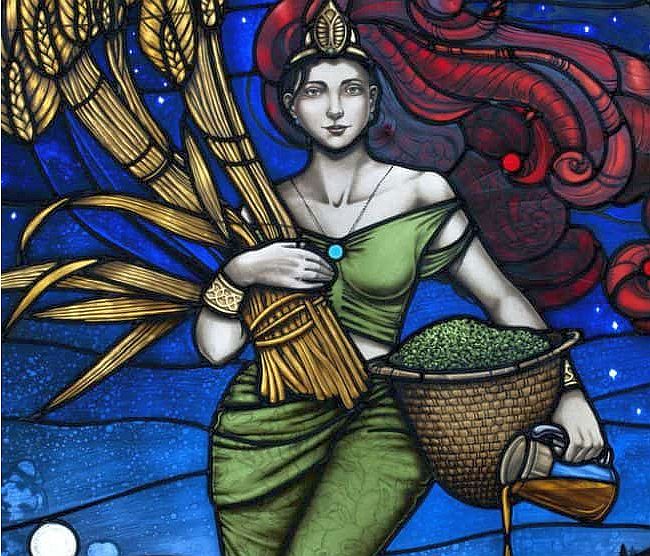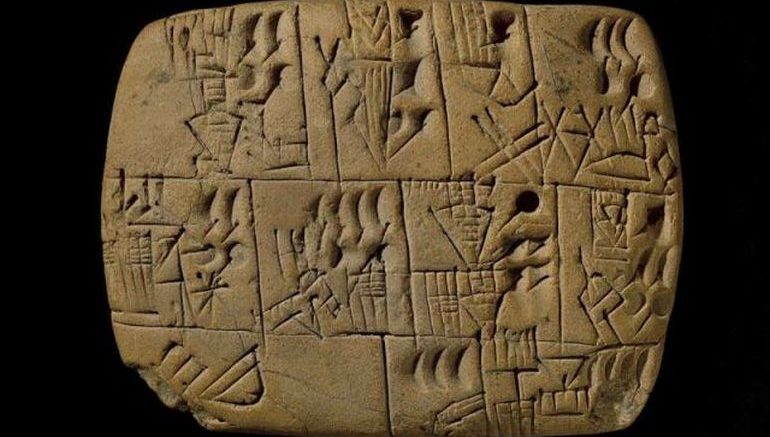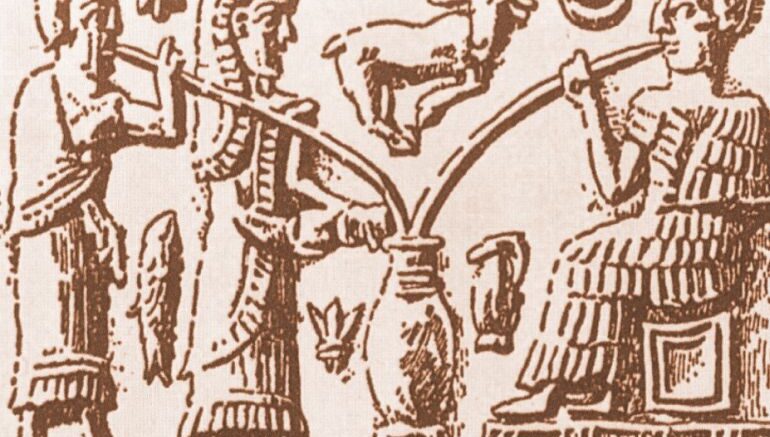It is hypothesized that beer (or at least the precursor to beer-like concoctions) was probably developed independently in different parts of the world. In fact, some believe that beer was actually the by-product of cereal-based agriculture, with natural fermentation playing its part in the ‘accidental’ lead-up to the brewing. This dawn of proto-beer making possibly harks back to the early Neolithic period, circa 9500 BC.
However, beyond the scope of localized variants of beer-like concoctions, historians are certain of one aspect of this parcel of history – the oldest known standard recipe for brewing beer comes from ancient Mesopotamia. Simply put, the first deliberate production of beer (or ale) in history can be attributed as one of the achievements of Sumerians, with the evidence of the oldest known surviving beer recipe contained within a 3900-year-old poem – Hymn to Ninkasi.
Now in terms of Mesopotamian mythology, Ninkasi was the ancient Sumerian tutelary goddess of beer (and alcohol). Symbolizing the socially important role of women in brewing and preparation of beverages in ancient Mesopotamia, the entity (whose actual depictions have not survived the rigors of time) historically also alluded to how beer consumption in itself was an important marker for societal and civilized virtues.
To give an example, in the Epic of Gilgamesh, the world’s oldest known epic, the wild man Enkidu “did not know how to eat bread, / nor had he ever learned to drink beer!”, with the second phrase suggesting how drinking beer was seen as a ‘quality’ of a civilized person. At the same time, the literary work also mentions the ‘social lubrication’ aspect of beer, with Enkidu, who later becomes Gilgamesh’s deeply beloved friend, enjoying his fair share of the beverage – “…he ate until he was full, drank seven pitchers of beer, his heart grew light, his face glowed and he sang out with joy.”

These earliest known mass-produced specimens of beer were possibly concocted with the aid of barley that was extracted from bread. In that regard, the Hymn to Ninkasi was actually translated from two clay tablets by Miguel Civil, Professor of Sumerology at the University of Chicago. And what’s more, the recipe was even successfully recreated by Fritz Maytag, founder of the Anchor Brewing Company in San Francisco. Upon listening to the presentation of these brewers at the annual meeting of the American Association of Micro Brewers in 1991, Civil wrote –
[The brewers] were able to taste ‘Ninkasi Beer’. sipping it from large jugs with drinking straws as they did four millennia ago. The beer had an alcohol concentration of 3.5%, very similar to modern beers, and had a ‘dry taste lacking in bitterness,’ ‘similar to hard apple cider.’ In Mesopotamia hops were unknown and beer was produced for immediate consumption, so the ‘Sumerian; beer didn’t keep very well, but everyone connected with the reconstruction of the process seems to have enjoyed the experience.
Coming to the historical scope of beer consumption, while the first known literary evidence, in the form of the Hymn to Ninkasi, dates from circa 1800 BC, the ‘brewing song’ in itself is undoubtedly older. In other words, beer was made and consumed in Mesopotamia long before the onset of the 19th century BC. In fact, archaeological evidence for brewing beer in the Mesopotamian region dates back to circa 3500 BC (or possibly even before), with researchers being able to identify chemical traces of the beverage in a fragmented jar at the ancient Sumerian trading settlement of Godin Tepe, in modern-day Iran.

Interestingly enough, a different clay tablet dating back to circa 3300 BC (pictured above), salvaged from the Sumerian city of Uruk, depicts a human head eating from a bowl and drinking from a conical vessel. The bowl represents ‘ration’, while the conical glass alludes to the consumption of beer.
The tablet also consists of cuneiform records of the quantity of beer being assigned to each worker. In essence, the ancient Mesopotamian artifact is the world’s oldest known payslip that rather hints at how the hierarchical system of workers and employers existed even five millennia ago – and they were possibly connected by the exchange of beer, instead of money as we know today (which was invented around three centuries later).
And lastly, in case one is interested in the English translation of the Hymn to Ninkasi (by Miguel Civil), he can take a gander at the passage below –
Borne of the flowing water,
Tenderly cared for by the Ninhursag,
Borne of the flowing water,
Tenderly cared for by the Ninhursag,Having founded your town by the sacred lake,
She finished its great walls for you,
Ninkasi, having founded your town by the sacred lake,
She finished its walls for you,Your father is Enki, Lord Nidimmud,
Your mother is Ninti, the queen of the sacred lake.
Ninkasi, your father is Enki, Lord Nidimmud,
Your mother is Ninti, the queen of the sacred lake.You are the one who handles the dough [and] with a big shovel,
Mixing in a pit, the bappir with sweet aromatics,
Ninkasi, you are the one who handles the dough [and] with a big shovel,
Mixing in a pit, the bappir with 2025 – honey,You are the one who bakes the bappir in the big oven,
Puts in order the piles of hulled grains,
Ninkasi, you are the one who bakes the bappir in the big oven,
Puts in order the piles of hulled grains,You are the one who waters the malt set on the ground,
The noble dogs keep away even the potentates,
Ninkasi, you are the one who waters the malt set on the ground,
The noble dogs keep away even the potentates,You are the one who soaks the malt in a jar,
The waves rise, the waves fall.
Ninkasi, you are the one who soaks the malt in a jar,
The waves rise, the waves fall.You are the one who spreads the cooked mash on large reed mats,
Coolness overcomes,
Ninkasi, you are the one who spreads the cooked mash on large reed mats,
Coolness overcomes,You are the one who holds with both hands the great sweet wort,
Brewing [it] with honey [and] wine
(You the sweet wort to the vessel)
Ninkasi, (…)(You the sweet wort to the vessel)The filtering vat, which makes a pleasant sound,
You place appropriately on a large collector vat.
Ninkasi, the filtering vat, which makes a pleasant sound,
You place appropriately on a large collector vat.When you pour out the filtered beer of the collector vat,
It is [like] the onrush of Tigris and Euphrates.
Ninkasi, you are the one who pours out the filtered beer of the collector vat,
It is [like] the onrush of Tigris and Euphrates.
Other Sources: Ancient History Encyclopedia / OpenCulture
Featured Image Credit: Schneider-Weisse

Be the first to comment on "The World’s Oldest Known Beer Recipe Comes from Ancient Mesopotamia"